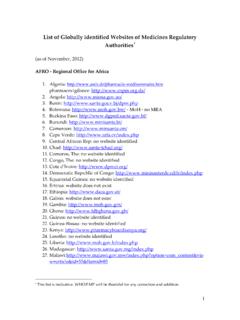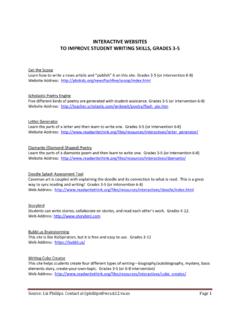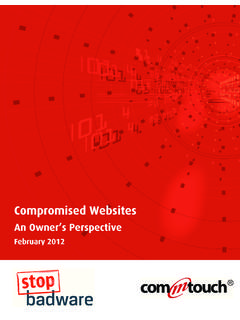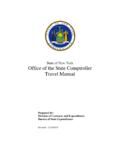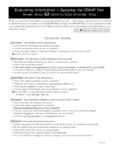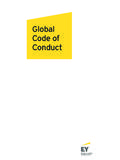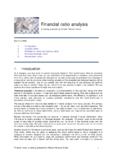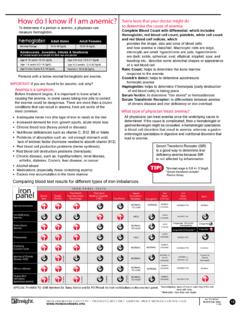Transcription of February 2012 - Legal Services Consumer Panel - …
1 Comparison websites February 2012 Comparison websites 2 CONTENTS 1 Summary 1 2 Introduction 5 3 Opportunities and challenges 8 4 Ensuring credible comparison websites 16 5 Are the standards being followed? 22 6 Conclusions 35 Annex: Draft standards 38 Notes 40 Comparison websites 1 1 Summary Background This report examines comparison websites as a form of choice tool for helping consumers to purchase Legal Services . Surveys show consumers would like access to such tools to compare and contrast providers, but only 1% who bought Legal Services in the last two years have used one. Some specialist websites have recently emerged to meet this demand. This report looks at four types: Directories listings of providers who may pay a basic fee to be listed or a larger fee for an enhanced listing; Feedback websites allow previous clients to provide feedback on their experience for others to read, often incorporating a scoring mechanism such as a star rating; Referral websites the website collects basic information about the Consumer s needs and passes the lead to one or more subscribing providers; and Price comparison websites allow consumers to instantly compare and make a choice between subscribing providers against defined search criteria such as price and quality.
2 There is debate over the suitability of comparison websites in Legal Services , but our starting point is that they are likely to have an increasing influence on Consumer choice and so the focus as the market emerges should be on maximising the benefits whilst protecting consumers from the potential risks. In this context, the report first considers the opportunities and challenges facing consumers, law firms and the websites. The second half of the report considers the standards which should underpin comparison websites, as there is evidence from other sectors that they do not always fully work in the interests of consumers; we would prefer to avoid these problems. In order to road-test the standards a small mystery shopping exercise was conducted using two simple but common scenarios: buying a home and making a will.
3 Opportunities and challenges A key potential benefit of comparison websites, and one which addresses a real challenge in this sector, is enhancing access to Legal Services . People have little knowledge of the law and are not shopping around. Comparison websites can help to more easily connect consumers to suitable providers and provide helpful guides on choosing lawyers and areas of law. Another potential benefit is to encourage greater competition on prices by offering a quick and convenient means for consumers to shop around and could be an incentive for providers offering good terms to disclose this information. There is also evidence that comparison websites which provide customer feedback can stimulate competition over quality and raise service standards. Although the profession fears that such sites may unfairly damage their reputations, research suggests people are actually more likely to leave positive than negative feedback.
4 Comparison websites 2 Some stakeholders feel that comparison websites are unsuitable for Legal Services . There is concern about consumers choosing the wrong provider because they lack understanding of the best solution for their Legal needs. Moreover, they consider that the emotional nature of Legal problems means people will find such Services too remote. From a provider s point of view, the nature of Legal advice which is not uniform and the required effort is hard to predict makes it difficult to price accurately in advance, yet standardised packages and costs are the lifeblood of price comparison websites. In our interviews with industry practitioners, the perception that comparison websites and Legal Services are simply not a good fit was the most common explanation for why they have yet to take off.
5 Other factors suggested included issues around market structure: for example, it is too fragmented and consumers require Legal Services too infrequently and do not shop around. It is also said that the profession is culturally averse to marketing whilst there are also more practical barriers, such as lack of access to professional registers. The Panel views these challenges as real, although in some cases exaggerated. It is also possible to see market changes the ABS reforms, technological advances and rising Consumer power as likely to erode these away. This includes more Legal Services being delivered in standardised packages which facilitate easy online comparisons. The emergence of familiar Legal brands taking a growing market share, each offering fixed fee Services for a wide range of Legal advice, will enable and stimulate demand for tools enabling comparisons of these.
6 This is unlikely to happen in every or even most areas of law, but the most likely Services conveyancing, personal injury and wills are those currently representing significant proportions of Consumer spend. Standards As intermediaries between providers and consumers, comparison websites have to balance the interests of both sides; there are risks of consumers being exploited by gaming tactics and other practices, such as invasion of privacy, which can be hard for them to spot or to do anything about. This can actually reduce transparency and create the risk of consumers making poor choices. Research shows that consumers adopt a relatively savvy approach to using these sites that recognises the advantages and drawbacks. Despite this, a series of regulatory and self-regulatory interventions have been seen in the communications, energy and financial Services sectors in an attempt to tackle Consumer detriment.
7 The Panel has developed 20 standards which, if adopted, we consider would help to underpin Consumer trust. This report presents these in draft form to provoke debate. The standards are reproduced in the Annex for easy reference grouped under the following six headings: Accessibility to disabled users; offline contact information; educational materials about the law; explanation of terms on comparison tables; Independence and impartiality the need for sites to be independent of providers; transparency about sources of revenue, including referral fees; and commercial influence on presentation of information being clearly identified; Enabling good choices market coverage; comparison on features other than price; ability to sort, filter and shortlist; transparency on assumptions about consumers; informing consumers when a match is not possible; Accuracy clear, full and accurate price information; keeping educational materials up-to-date; marketing claims.
8 Comparison websites 3 Use of personal information privacy policies; collecting personal details; passing details to third parties; opting out of marketing communications; and Complaints a complaints procedure. In order to understand more about how these standards applied in practice, our mystery shopping involved two elements: exploration of websites in detail to ensure all information relevant to the standards was recorded; and obtaining a quote in order to assess them from the user perspective. Sixteen websites were assessed in the exercise. Scrutiny of websites We were pleased there was no evidence of commercial influence on the presentation of information such that consumers might make poor choices. Nor did the websites make assumptions about user preferences which could alter the order of providers in comparison tables.
9 Overall, there was little marketing on the websites. Performance was mixed on transparency. This was so around ownership, funding streams and, in particular, on market coverage, which we inferred from search results was often low. Linked to this was evidence of some dubious marketing claims, especially around quality claims. There was poor performance in respect of use of personal information. Whilst many websites had privacy policies, personal details are being passed to third parties without consent. Consumers are not being given appropriate opportunity to opt out of this or to stop receiving marketing from the websites. Rather, giving up valued privacy seems to be a condition of using many of these comparison Services . User experience A surprising finding was that 8 out of 10 search requests for a simple will made using enquiry forms did not get responses from providers; in conveyancing this was 5 out of 10.
10 We understand this is likely to be because providers considered these leads to be commercially unattractive. However, this is not very helpful for consumers, who are unlikely to return to websites if their needs were not fulfilled previously. The exercise found mixed results around pricing. There was some evidence of good practice, for example fully inclusive and itemised quotes. However, the websites, and sometimes different providers on the same website , priced their Services in different ways making comparisons hard. For example, some conveyancing quotes included disbursements, others did not. Finally, the mystery shopping process revealed some of the advantages and drawbacks of the different website models. Referral sites are the most common. They have the advantage of the human touch and make claims around vetting providers.


